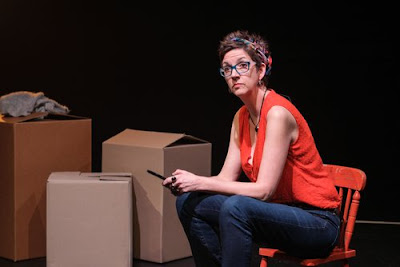WHEN: 19 - 29 July 2023
WHERE: Theatre Works (Explosives Factory)
WRITTEN & PERFORMED BY: Katie Pollock
DIRECTED BY: Anthony Skuse
LIGHTING BY: James Wallis
SOUND BY: Cluny Edwards
 |
| Katie Pollock - photo by Teniola Komolafe |
People come down pretty hard on Facebook as part of the whole 'let's hate on social media' zeitgeist but this platform has done a lot for connecting people in a positive way if you bother to really look at it. Some of those connections include buy/swap/sell groups and community groups like the Good Karma stable of sites. One fun version of that is the Rough Trade pages. Katie Pollock has decided to let us in on the culture and people who use Rough Trade in her play Rough Trade presented by Rogue Projects at Theatre Works Explosives Factory.
The play begins with a bit of fun about the sex life of slugs and the double entendre of the phrase 'rough trade' which is a term used when men who are rich have sex with men of the working classes. After we get past all that let's get bums on seats stuff, Pollock goes on to tell us a funny, intriguing, poignant, and heart breaking story about the types of trades and people who make them through sites like Rough Trade.
The character (I don't think she has a name) is a 50+ woman who finds herself on unemployment benefits for the first time in her life. She has had to downsize her life to some sort of communal living situation and has become an avid participator in the Rough Trade community. There are rules to the Rough Trade community including no cash - trades only - and no profiteering. Thus we have the question of perceived value. What is a lemon worth? Can someone find value in a bunch of slugs on the doorstep?
Most of the show is funny anecdotes and strange trades but there is heart and soul in the character. Almost as an aside we learn she is 3 days from her next dole payment and has no food, and she never invites her children to her place so they can't see how she is living. The Rough Trade site has become her lifeline, not just a convenience and when Facebook shuts it down for breach of code of conduct the impact is far more than just a shut down page.
This story is the heart of the work and the almost accidently dropping of these key bits of information tugs at the heart strings in ways that being forthright would never achieve. It is that secret life of desperation and shame that the 50+ group of women are hiding in current times which is so powerful and it is a story we aren't telling because as a society we don't seem to be able to get our head around how this demographic could find themselves in these terrible circumstances. To be fair, I reckon the women in question don't know how it happened either.
Pollock is not a trained actor, she is a writer, and it is kind of evident in the way she moves and her voice. I mention the voice for a couple of reasons. Firstly, Pollock doesn't use diaphragmatic breathing so there is not much projection. This is not a big problem because she has a radio mic to support it.
Pollock tells us the story of the guy on TedX who started with a red paperclip and kept trading up until he ended up with a house. (This is not in the spirit of the Rough Trade sites so don't try it, you will be hammered) and I really wish director Anthony Skuse had lent into that as a performance style rather than creating a theatrical space. Because of Pollock's natural style, Rough Trade would have worked so well as a faux TedX talk. Instead there is a dissonance between the theatricality of the production and the non-theatricality of Pollock's demeanour. It is her earnestness and authenticity and a strong script which saves the show, rather than strong performance choices.
Following on from this I need to talk about the lighting (James Wallis). The lighting design is excellent with beams of open white enclosing Polloc in a square box, with dips and shades of colour as needed. What I am less happy about is the outrageous overuse of the smoke machine.
This play is static and minimalist and the lighting fixtures are static. There is no dramaturgical reason for the haze and, in fact, it is evident it is causing Pollock harm. Her vocal chords are drying out and tightening and if she continues to work in this environment without good vocal care she is in danger of permanent damage. Smoke/haze/fog are not benign elements and must be used with caution (and dramaturgical intention). In this case the smoke actually distracts from the performance as it draws the eye away from the performer to watch pretty swirls up in the grid and it is pumping hard. I don't want to see you, Wallis, I want to see the world of the play!
On the other hand, the sound design created by Cluny Edwards is sparse yet powerful. The constant dinging of notifications was just the right balance to demonstrate how tethered the character is to Rough Trade without becoming an annoyance.
Rough Trade is quite a powerful story and told in a compelling way. Watching it, it is one of those shows in which it becomes evident that there are a lot of different ways the show can be performed which is exciting for women who are looking for solid, meaty one-person shows to produce. The play is available through Currency Press.
3 Stars



